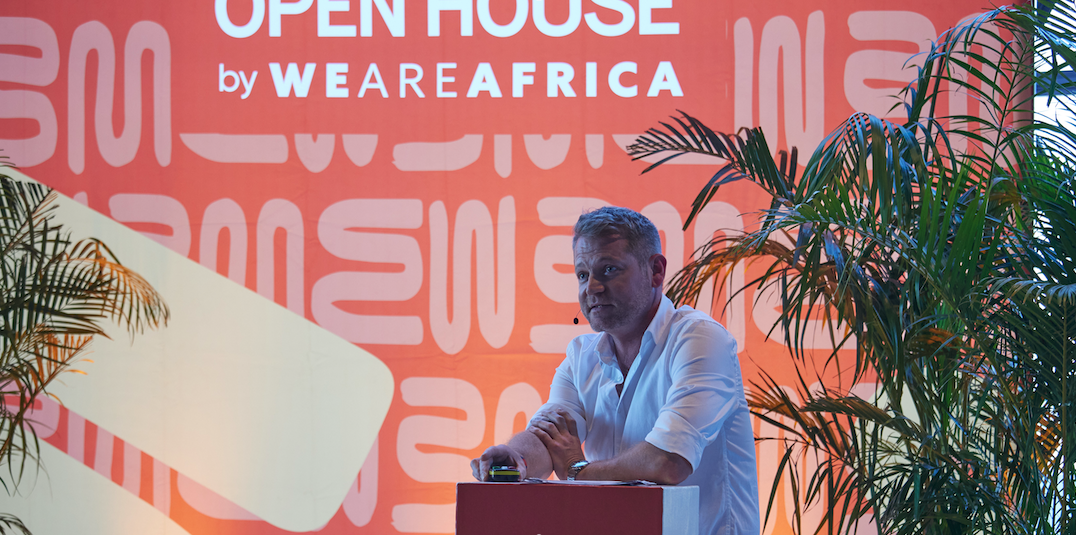
This year’s Open House by We Are Africa was a collective reawakening to examine the continent as an endless source of imagination, invention and innovation – a call to look deeper, to uncover Africa’s often overlooked magic, and to steer Africa into the future, one story at a time…
From Tradition to Table – A Deeply Personal Session on Heritage
At We Are Africa, Jan Hendrik van der Westhuizen took to the stage with a message that resonated far beyond the plate. In this soul-stirring session, heritage was redefined – Through the lens of food, storytelling, music, and personal memory, Jan Hendrik Van Der Westhuizen invited the audience to rethink culture as something we live, feel, and share with others, and most importantly, with ourselves.
At the heart of the session was a powerful truth: in a world of increasing sameness, the hunger for meaningful, authentic experiences is only growing. Whether seated at a table or exploring the world, travellers crave emotional connection, and heritage is one of the richest sources Africa has available.
The session also turned the spotlight inward, asking travel professionals to reflect on their “why.” Why do we serve? How do we stay rooted while embracing change? And what does it mean to lead with vulnerability and purpose in today’s travel landscape?
But this was not a nostalgic journey – it was a call to action. A call to see tradition and innovation not as opposites, but as collaborators in telling a more layered, honest story about Africa’s place in the world.
Imagination, Africa’s Best Kept Secret
In a compelling and deeply resonant session, Dali Tembo unpacked the powerful role of imagination as Africa’s hidden superpower. At Open House by We Are Africa, Dali delivered a session that challenged travel professionals to rethink how they see the continent and how they tell its story. Drawing from his global perspective and on-the-ground experience, he explored how adversity across the continent has long been a driver, not a deterrent, of innovation.
Dali spotlighted the strength of Africa’s informal economies, its vibrant community-driven models, and its unmatched entrepreneurial spirit as often-overlooked sources of ingenuity. He urged the audience to embrace cultural intelligence and “small data” as keys to unlocking meaningful connections with African consumers.
For travel professionals, the takeaway was profound: Africa’s story is still being written, and imagination is holding the pen. To stay relevant in this market, we must do more than admire the view. We must listen, learn, and lean into the creative energy that has always existed here, often unnoticed, and now ready to rise.
At the heart of his message was a challenge to brands: move beyond surface-level engagement and lean into purpose-driven strategy. For Dali, the brands that will thrive are those that see struggle not as a barrier, but as a springboard for imaginative, authentic growth.
 The Smallest Species Matter
The Smallest Species Matter
In one of the most inspiring sessions at Open House, Yolan Friedmann, CEO of the Endangered Wildlife Trust (EWT), offered a powerful glimpse into a bold new frontier in African conservation – one that is as expansive in scope as it is intimate in detail.
What began over five decades ago with a focus on the continent’s iconic rhinos and carnivores has since evolved into a groundbreaking mission to protect the continent’s most overlooked and often most vulnerable species.
From butterflies and frogs to rare plants once thought extinct, EWT is leading the charge to find and safeguard life forms that rarely make headlines. Their work is fuelled by science, innovation, and an unwavering belief that no species is too small to matter.
The talk showcased extraordinary fieldwork, including DNA sampling in desert sand dunes and the rediscovery of ‘lost’ species. A standout highlight was the organisation’s conservation dog unit; four-legged heroes trained to detect everything from wildlife contraband in cargo (think rhino horns, elephant ivory, pangolin scales and lion bones) to endangered succulents at roadblocks. These dogs not only track poachers and collect genetic data from cheetah scat, but also help prevent bird strikes at airports and protect livestock from predators.
This is conservation at its most creative—and most hopeful.
For those of us in the business of storytelling, hospitality, and travel design, Yolan’s message was clear: Africa’s natural heritage is more than simply the Big Five. It’s a vast and delicate web of life, each thread essential to the integrity of the whole. As we shape the future of African travel, partnering with organisations like EWT offers a chance to tell richer, more inclusive stories and protect the future that makes travel here so remarkable.





